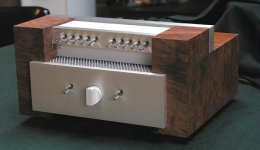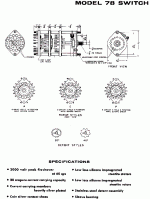Is it a good idea to use a 4PDT toggle switch to switch between two inputs? I have two inputs on my integrated EL34 SE and I wanted to use a toggle switch for aesthetic reasons but I've heard that it could be noisy. The 4PDT toggle switch I have has a 10 milli ohm contact resistance @2-4V. I just want to make sure it will work before I mindlessly drill a hole into my beautiful chassis.
On the other hand, how do I implement 3 or 4 inputs or in other words what kind of rotary switch do I need for it? I've never done more than pair of RCA input until now...
On the other hand, how do I implement 3 or 4 inputs or in other words what kind of rotary switch do I need for it? I've never done more than pair of RCA input until now...
To avoid pops and other noise when switching, I like to use make-before-break rotary switches. These are also known as shorting rotary switches. Toggles are only non-shorting as far as I know. One could even go so far as to use extra sections on a rotary to short out any selection that is not in use. Some say this helps reduce crosstalk, although I've not found that to be much of a problem. You probably don't need to switch the ground side, only the hot side. Small DIP relays are another idea.
Victor
Victor
If it this switch,
http://www.web-tronics.com/general-...-switches-miniature-toggle-switches-4pdt.html
it should be a good choice to switch between two stereo RCA inputs.
http://www.web-tronics.com/general-...-switches-miniature-toggle-switches-4pdt.html
it should be a good choice to switch between two stereo RCA inputs.
I use toggle switches in my integrated amp and they work great: http://www.diyaudio.com/forums/showthread.php?postid=1069555#post1069555
The TOCOS Toggle Switches have superior quality silver contacts and can be sourced from Percy Audio.
The TOCOS Toggle Switches have superior quality silver contacts and can be sourced from Percy Audio.
Attachments
There are toggle switches made for high power or electric motors, for a full size switch these will say 10 Amps or maybe 1/2 HP. These types typically have Cadmium contacts and will become noisy. Purists will not like anything other than silver or maybe gold contacts.
Spend a few dollars, buy the right switch (such as from Percy) especially if you're going to drill holes in a nice front panel.
Spend a few dollars, buy the right switch (such as from Percy) especially if you're going to drill holes in a nice front panel.
Sorry to resurrect an old thread, but I have a legitimate question.
Why are gold and silver contacts considered superior in switches? Isn't copper a better conductor than either? Is it really likely to corrode very much when encased inside the switch housing, in a typical home environment? That's the only reason for silver and gold right? Corrosion resistance?
Why are gold and silver contacts considered superior in switches? Isn't copper a better conductor than either? Is it really likely to corrode very much when encased inside the switch housing, in a typical home environment? That's the only reason for silver and gold right? Corrosion resistance?
If I recall correctly, copper when it is exposed to an oxygen environment creates a layer on the surface (That green stuff) that changes the resistance value for the worse wheras silver changes to silver oxide...which is a conductor similar to the unaltered silver.
_____________________________________________Rick......
_____________________________________________Rick......
Attachments
I have for a long time used a DPDT (center off) toggle for input switching, since I and a lot of other guys only have two sources, and a good toggle is one sixth the cost of a good rotary. I use the E-Switch silver contact, Digi-Key part EG2417-ND. It's hermetically sealed (for wave soldering, presumably) so I don't worry about degradation of the contacts. I have had them in use in my own rig for years without any sonic degradation, and I confidently include them in the lifetime warranty on my stuff. I guess I must like 'em.
Aloha,
Poinz
Aloha,
Poinz
Poindexter said:I have for a long time used a DPDT (center off) toggle for input switching, since I and a lot of other guys only have two sources, and a good toggle is one sixth the cost of a good rotary. I use the E-Switch silver contact, Digi-Key part EG2417-ND. It's hermetically sealed (for wave soldering, presumably) so I don't worry about degradation of the contacts. I have had them in use in my own rig for years without any sonic degradation, and I confidently include them in the lifetime warranty on my stuff. I guess I must like 'em.
Aloha,
Poinz
With only two poles, doesn't that mean that you have to join all of the grounds? Isn't that bad? I keep reading conflicting things about input grounding.
1. Gold does not oxidize, the limitation for gold contacts is that it is usually plated over nickel which is considered a poor metal choice by many audiophiles.garak said:Sorry to resurrect an old thread, but I have a legitimate question.
Why are gold and silver contacts considered superior in switches? Isn't copper a better conductor than either? Is it really likely to corrode very much when encased inside the switch housing, in a typical home environment? That's the only reason for silver and gold right? Corrosion resistance?
2. Silver is a better conductor than copper. Silver oxide is both conductive and thin so any wiping action of contacts is likely to clean the contact surface.
3. Copper will oxidize in a home environment, the switches are not hermetically sealed and normal humidity and atmospheric oxygen will initiate the corrosion process.
Additional contact materials include palladium, rhodium and cadmium. Palladium and rhodium are probably good choices, cadmium is typically used in switches where high degree or arcing is expected (motors, etc). I would advise sticking with silver or gold contacts.
hermanv said:
1. Gold does not oxidize, the limitation for gold contacts is that it is usually plated over nickel which is considered a poor metal choice by many audiophiles.
2. Silver is a better conductor than copper. Silver oxide is both conductive and thin so any wiping action of contacts is likely to clean the contact surface.
3. Copper will oxidize in a home environment, the switches are not hermetically sealed and normal humidity and atmospheric oxygen will initiate the corrosion process.
Additional contact materials include palladium, rhodium and cadmium. Palladium and rhodium are probably good choices, cadmium is typically used in switches where high degree or arcing is expected (motors, etc). I would advise sticking with silver or gold contacts.
Good info, thank you, that finally answers it for me.
One question though -- why do so few RCA jacks or speaker binding posts use silver plating instead of gold? Seems like it would be ideal. And it's a lot cheaper. In fact, the only silver ones I can find are really expensive, and some gold ones are really cheap. Do the low-end ones merely use gold over silver for the "bling" factor?
Silver or gold plating for switch contacts is really a non-starter as either will scrape off the plating in short order.
The plating on binding posts, RCA connectors and tube sockets will scrape away after a handful "applications".
Only a solid silver (Or gold) contact will perform in a superior fashion.
Making a binding post, RCA et.al. out of solid silver/Gold would be very expensive. Note the use of the term "coin silver" which I would assume is an alloy of silver as pure silver and gold is too soft for this application.
The plating on binding posts, RCA connectors and tube sockets will scrape away after a handful "applications".
Only a solid silver (Or gold) contact will perform in a superior fashion.
Making a binding post, RCA et.al. out of solid silver/Gold would be very expensive. Note the use of the term "coin silver" which I would assume is an alloy of silver as pure silver and gold is too soft for this application.
Richard Ellis said:Silver or gold plating for switch contacts is really a non-starter as either will scrape off the plating in short order.
The plating on binding posts, RCA connectors and tube sockets will scrape away after a handful "applications".
Only a solid silver (Or gold) contact will perform in a superior fashion.
Making a binding post, RCA et.al. out of solid silver/Gold would be very expensive. Note the use of the term "coin silver" which I would assume is an alloy of silver as pure silver and gold is too soft for this application.
You're reinforcing the urge I have to just go super cheapo. The pseudoscience in the audio community is really frustrating.
It certainly is. The contacts of a switch are carefully designed and shaped, and if the PM plating is of good thickness, the switch will last for tens or hundreds of thousands of cycles operation. This specification is available in the datasheet under 'cycle lifetime'.
As far as the isolation of individual input grounds; from what? Each other? I ground all inputs and outputs to a single 14ga. bus going shortest distance across the back of the chassis, and take that ground to the circuit star point. I have never in me short life heard of switching audio hots and grounds for individual channels separately, but if that floats your boat, knock yourself out.
Yes, bro, there's a very great deal of pseudoscience, folklore, and hearsay in ultra audio. Brilliant Pebbles, anybody?
Aloha,
Poinz
As far as the isolation of individual input grounds; from what? Each other? I ground all inputs and outputs to a single 14ga. bus going shortest distance across the back of the chassis, and take that ground to the circuit star point. I have never in me short life heard of switching audio hots and grounds for individual channels separately, but if that floats your boat, knock yourself out.
Yes, bro, there's a very great deal of pseudoscience, folklore, and hearsay in ultra audio. Brilliant Pebbles, anybody?
Aloha,
Poinz
Poindexter,
When I first started building amps (chip amps) I thought that keeping the signal grounds separate was a good idea. Found that my amps had ground loop problems. After much putzing around, discovered that my sources and my pre amp had the grounds for both signal channels tied together. I then used the exact method you describe and fixed completely my ground loop problem. I now tie all signal grounds at the RCA inputs at the back of the chassis exactly as you describe.
Cheers,
Chris
When I first started building amps (chip amps) I thought that keeping the signal grounds separate was a good idea. Found that my amps had ground loop problems. After much putzing around, discovered that my sources and my pre amp had the grounds for both signal channels tied together. I then used the exact method you describe and fixed completely my ground loop problem. I now tie all signal grounds at the RCA inputs at the back of the chassis exactly as you describe.
Cheers,
Chris
- Status
- This old topic is closed. If you want to reopen this topic, contact a moderator using the "Report Post" button.
- Home
- Design & Build
- Parts
- toggle switch for input selector

